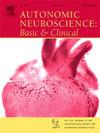Exercise-mediated modulation of autonomic nervous system and inflammatory response in sleep-deprived individuals: A narrative reviews of implications for cardiovascular health
IF 3.3
4区 医学
Q2 NEUROSCIENCES
引用次数: 0
Abstract
Sleep deprivation is a growing concern in cardiovascular risk, causing physiological disruptions like autonomic dysregulation and inflammation. Recent research indicates that sleep deprivation increases sympathetic nervous activity while decreasing parasympathetic activity, leading to increased blood pressure, impaired endothelial function, and heightened inflammation. Exercise has emerged as a non-pharmacological approach to increase cardiovascular health. However, the impact of exercise on sleep deprivation-induced changes in autonomic activity and inflammation remains unclear. To explore this, we reviewed studies investigating the effects of acute exercise on autonomic regulation and inflammatory markers following sleep deprivation. We conducted a narrative review of the literature. PubMed/MEDLINE, Google Scholar, and Web of Science (WOS) searched the articles between May 2022 and April 2023. The papers had to: [1] focus on recent studies between 2000 and 2023; [2] consist of sleep deprivation participants; [3] be published in English. Acute moderate- to high-intensity exercise after sleep deprivation may reduce parasympathetic activity, trigger pro-inflammatory cytokines, and delay recovery to normal levels. In contrast, regular exercise routines may mitigate the adverse effects of sleep deprivation on autonomic regulation and reduce systemic inflammation. Sleep deprivation can lead to autonomic imbalance, increased blood pressure, and increased inflammatory responses, which are further amplified by acute exercise, increasing the cardiovascular burden. When sleep deprivation occurs, exercise intensity and timing should be carefully chosen to avoid adverse cardiovascular health risks.

运动介导的自主神经系统调节和睡眠剥夺个体的炎症反应:对心血管健康影响的叙述性回顾
人们越来越担心睡眠不足会导致心血管疾病,导致自主神经失调和炎症等生理紊乱。最近的研究表明,睡眠剥夺会增加交感神经活动,同时降低副交感神经活动,导致血压升高、内皮功能受损和炎症加剧。运动已经成为一种非药物的方法来增加心血管健康。然而,运动对睡眠剥夺引起的自主神经活动和炎症变化的影响尚不清楚。为了探讨这一点,我们回顾了关于睡眠剥夺后急性运动对自主神经调节和炎症标志物影响的研究。我们对文献进行了叙述性回顾。PubMed/MEDLINE、b谷歌Scholar和Web of Science (WOS)检索了2022年5月至2023年4月之间的文章。论文必须关注2000年至2023年之间的最新研究;[2]由睡眠剥夺参与者组成;b[3]将以英文出版。睡眠剥夺后的急性中高强度运动可降低副交感神经活动,触发促炎细胞因子,并延迟恢复到正常水平。相反,有规律的锻炼可以减轻睡眠剥夺对自主神经调节的不利影响,减少全身炎症。睡眠不足会导致自主神经失衡、血压升高和炎症反应加剧,这些会在急性运动中进一步放大,从而增加心血管负担。当发生睡眠剥夺时,应仔细选择运动强度和时间,以避免不利的心血管健康风险。
本文章由计算机程序翻译,如有差异,请以英文原文为准。
求助全文
约1分钟内获得全文
求助全文
来源期刊
CiteScore
5.80
自引率
7.40%
发文量
83
审稿时长
66 days
期刊介绍:
This is an international journal with broad coverage of all aspects of the autonomic nervous system in man and animals. The main areas of interest include the innervation of blood vessels and viscera, autonomic ganglia, efferent and afferent autonomic pathways, and autonomic nuclei and pathways in the central nervous system.
The Editors will consider papers that deal with any aspect of the autonomic nervous system, including structure, physiology, pharmacology, biochemistry, development, evolution, ageing, behavioural aspects, integrative role and influence on emotional and physical states of the body. Interdisciplinary studies will be encouraged. Studies dealing with human pathology will be also welcome.

 求助内容:
求助内容: 应助结果提醒方式:
应助结果提醒方式:


